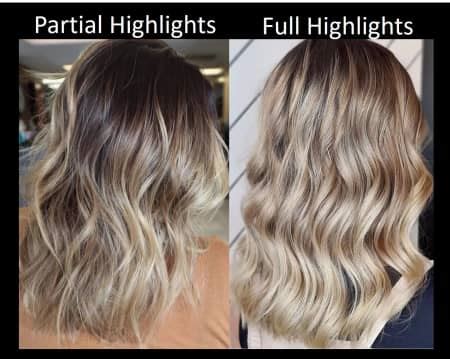Understanding the Full and Partial Glow-Up
When it comes to enhancing your locks with highlights, the choice between full and partial highlighting can transform your look. Let’s dive into the details to help you make an informed decision.

Full Highlight
This technique involves adding highlights to every section of your hair, from roots to ends. It creates a bold and eye-catching effect, adding depth and dimension to your tresses.
Partial Highlight
As the name suggests, this method concentrates on highlighting only certain sections of your hair, such as the roots, ends, or a specific layer. It offers a more subtle and natural-looking result.
The Pros and Cons of Each
Full Highlight:
Pros:
- Dramatic and striking effect
- Adds significant volume and movement
-
Blends well with naturally highlighted hair, such as sun-kissed strands
Cons: -
Can be more damaging to hair
- Requires more upkeep and touch-ups
- May not be suitable for fine or thin hair
Partial Highlight:
Pros:
- Less damaging
- Creates a natural-looking glow
-
Requires less maintenance
Cons: -
May not be as noticeable as full highlights
- Can appear stripey if not done correctly
- May not provide as much volume
Key Considerations
When choosing between full and partial highlighting, consider the following factors:
- Hair Type: Full highlights may weigh down fine hair, while partial highlights can add volume.
- Desired Effect: Full highlights create a bolder look, while partial highlights offer a more natural result.
- Maintenance: Full highlights require more frequent touch-ups than partial highlights.
- Cost: Full highlights typically cost more than partial highlights.
Trendy Applications
Salt and Pepper Highlights: This technique combines partial highlights with lowlights, creating a chic and edgy look reminiscent of salt and pepper hair.
Money Piece Highlights: Partial highlights are applied to the front sections of the hair, framing the face and creating a striking effect.
Peek-a-Boo Highlights: These hidden highlights are placed underneath the top layer of hair, revealing themselves in glimpses as the hair moves.
Effective Strategies
Blending Techniques: Ensure seamless transitions between highlighted and natural strands by using blending techniques, such as balayage or foiling.
Toning: Use toners to correct unwanted brassiness or yellow tones and enhance the desired color result.
Maintenance: Regular trims and deep conditioning treatments are crucial for maintaining the health of highlighted hair.
Common Mistakes to Avoid
Over-Processing: Exposing hair to excessive bleaching or highlighting can lead to breakage and damage.
Uneven Application: Highlights should be evenly distributed throughout the hair to prevent a patchy appearance.
Wrong Color Selection: Choose highlight colors that complement your natural hair color and skin tone.
Table 1: Full Highlight vs. Partial Highlight Comparison
| Feature | Full Highlight | Partial Highlight |
|---|---|---|
| Coverage | Entire head | Specific sections |
| Effect | Bold and noticeable | Subtle and natural |
| Damage | Higher potential | Lower potential |
| Maintenance | More frequent touch-ups | Less frequent touch-ups |
| Cost | Higher | Lower |
Table 2: Benefits of Full Highlights
| Benefit | Description |
|---|---|
| Adds Volume | Creates the illusion of thicker and fuller hair |
| Dramatic Transformation | Makes a significant impact on the overall look |
| Enhances Dimension | Breaks up the monotony of natural hair color, adding depth and interest |
| Blends Well with Natural Highlights | Complements sun-kissed strands or other natural highlights |
Table 3: Benefits of Partial Highlights
| Benefit | Description |
|---|---|
| Natural-Looking Glow | Adds subtle highlights that mimic natural sunlight |
| Less Damaging | Involves less bleaching, reducing the risk of hair damage |
| Low Maintenance | Requires less frequent touch-ups compared to full highlights |
| Versatile Styling | Can be used to create various effects, such as money piece highlights or peek-a-boo highlights |
Table 4: Common Mistakes to Avoid with Highlights
| Mistake | Solution |
|---|---|
| Over-Processing | Limit bleaching sessions to prevent breakage |
| Uneven Application | Use foiling or balayage techniques to ensure even distribution |
| Wrong Color Selection | Consult with a hairstylist to choose flattering colors |
